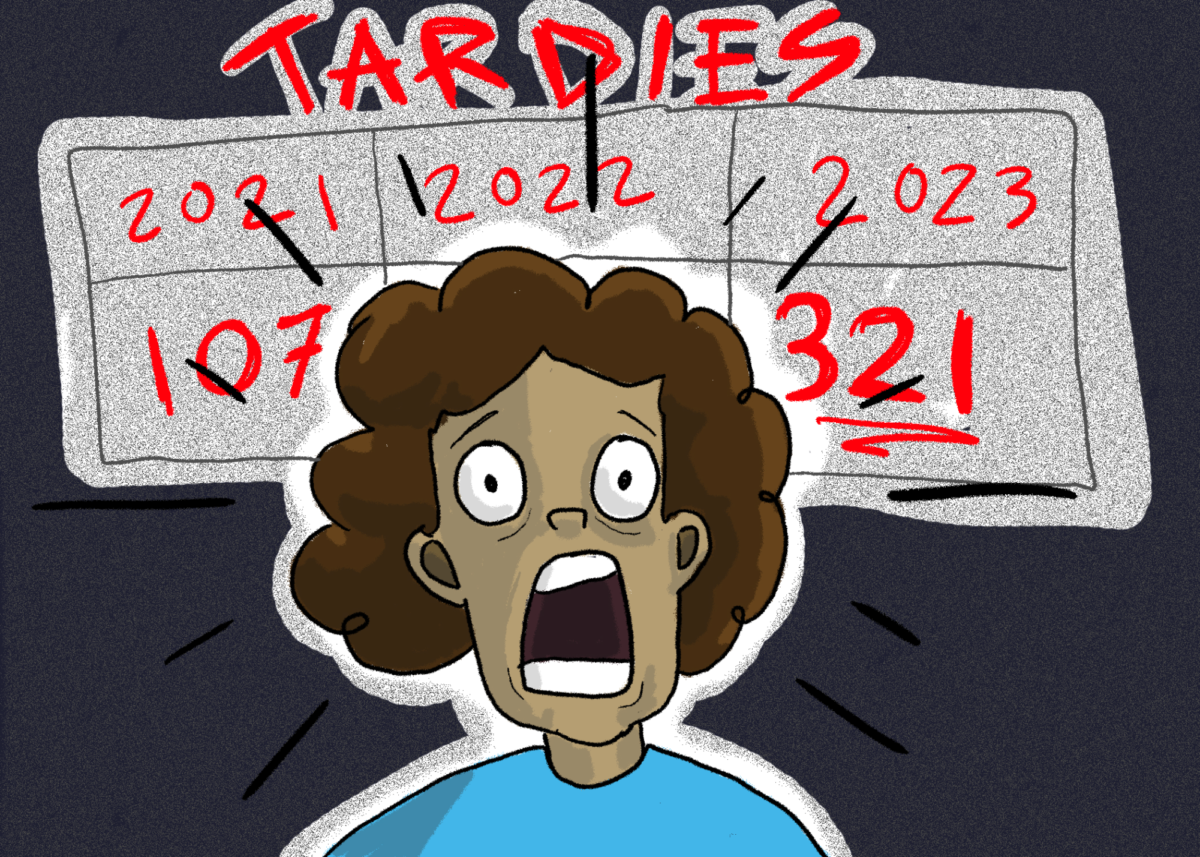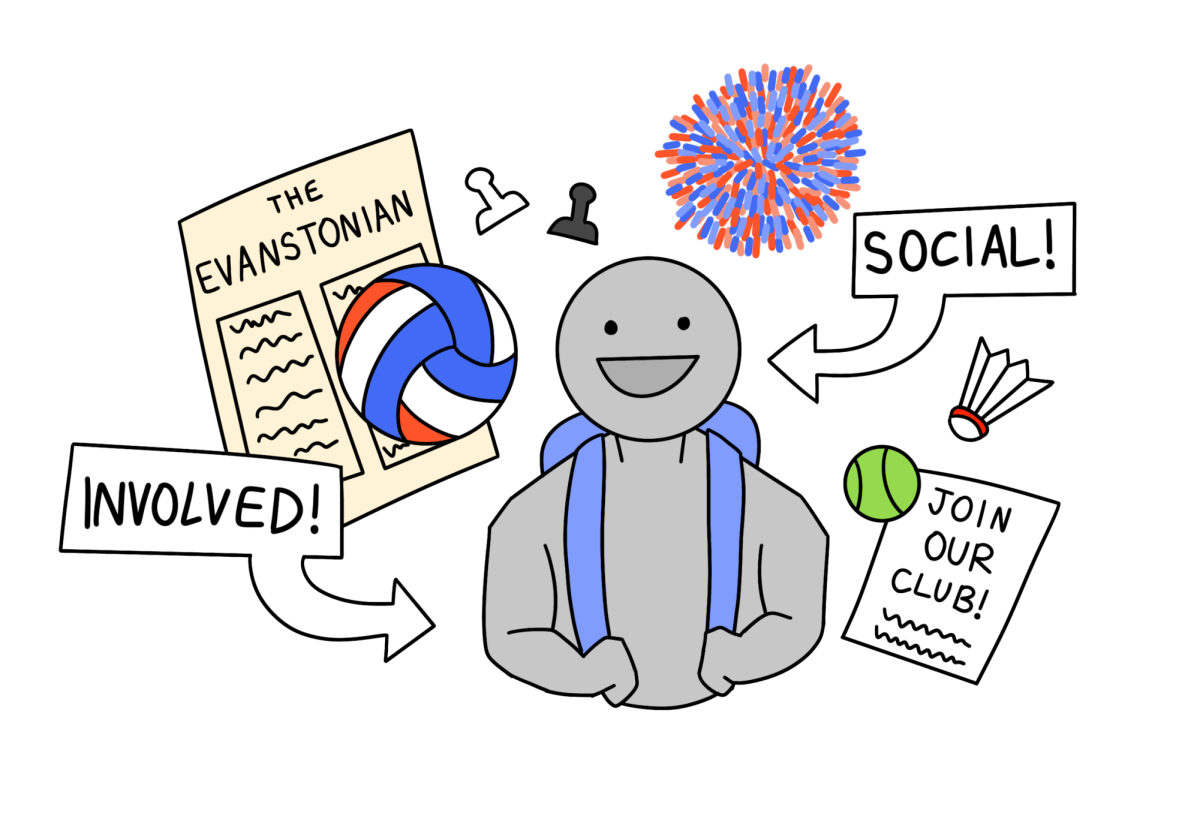Senior Lyana Hyman was just thirteen years old when she was admitted into the hospital for the first time and diagnosed with depression. Since then, Hyman’s continuous battle with mental health has followed her into high school, preventing her from performing to the best of her capabilities.
“During my high school years, I have been in total survival mode, [so] getting to class on time was the last thing I was worrying about,” Hyman explained.
By the end of Hyman’s junior year of high school, she knew she had accumulated a lot of tardies and was determined to have a fresh start the following year. But, the school’s rollover tardy policy—in which the tardies from every year of school show up on a student’s record—made this fresh start nearly impossible.
“I was still in survival mode but I was like ‘It’s time to lock in.’ I thought that [ETHS] was not going to roll the tardies over, and then I saw it and I was like, ‘Wow, there’s no point.’ It was so demotivating,” Hyman said.
Before checking her records, Hyman was unaware of this policy, not because of a lack of research on her part, but because the ETHS Student Handbook does not mention it at all.
“I know that the Student Handbook doesn’t explicitly say they carry on from year to year, but it is explicit as to what will accumulate,” Superintendent Marcus Campbell said.
Why is it not explicitly stated in the handbook? I’m not sure, but it definitely raises questions. Shouldn’t such a punitive and detrimental policy be bolded in the Student Handbook, let alone be in it at all? Maybe ETHS doesn’t want to be held accountable to the policy? One can only ponder.
When students exceed ten tardies, they are placed on detention probation, a term that echoes throughout ETHS hallways all year. These students face numerous consequences—not being able to go out for lunch, participate in their sport, attend games as fans, go to school dances or do pretty much anything non-academic that ETHS has to offer.
Now that Hyman is in her senior year, her mass amount of tardies has placed her on detention probation and prevented her from attending all of the school’s events.
“It’s lowkey sad; this is my last experience of high school. All this stuff—going to homecoming, going to football games, going to school events, I can’t even go. My friends call me, asking if I am going to the football games, and I have to tell them, ‘I can’t, I have too many tardies,’ Hyman elaborated. “It feels like criminalisation almost.”
The punitive nature of this policy doesn’t deter students from getting tardies or convince them to attend AM support to clear them. Rather, when students aren’t allowed in these events, it often detaches them from the ETHS community—only making them want to clear their tardies less.
“We know that many students are literally only connected to school by their team, their club, going to the homecoming dance– the non academic connections. If you cut that off, that’s the last attachment a kid has to the school. Instead of helping to reconnect and re-engage, you’re actually just essentially kicking them out. It is incredibly punitive,” said the Moran Center.
However, Hyman is determined to keep clearing tardies—even to an unhealthy extent.
“I have been going to AM support every single day, starving myself to go to the academic study center for lunch because I don’t have a free period,” Hyman said.. “I am being burdened by my past right now, [and] nobody likes to be burdened by their past.”
In response to the mental toll that this was taking on her, Hyman’s mother discussed her situation with members of the ETHS administration at the beginning of the school year. After a productive conversation with future plans to clear many of her tardies, Hyman and her family still haven’t heard back from the administration.
Thus, Hyman was left with no choice but to take matters into her own hands. In the middle of September, with the help of her mom, Hyman created a petition in hopes of ending the unfair policy. Since it was released to the public, the petition has already collected over 1200 signatures from students and community members alike.
“I spread the petition through social media as well as word of mouth. I sent it to a ton of people. My mom got me these little slips with the QR code, so I could get them around the school. I gave it to everybody. If people didn’t want it I said, ‘give it to someone else.’ I was just throwing them around, I’m not going to lie,” Hyman said, laughing.
Hyman isn’t alone in her experience. From the mass response her petition received, it is evident that many kids at ETHS have suffered stories just like hers. One person who signed the petition wrote, “I, too, struggled with mental health issues when I was at ETHS. The school does not do enough to help students and instead punishes them for things out of their control.” ETHS’ rollover policy is damaging in helping kids recover from rough months or years; it doesn’t just affect students while in high school, its lingering effects and ability to isolate students can be felt even after graduation.
At the beginning of every year, the administration repeatedly talks about all of the ways students can clear their tardies. As Campbell explained, “It used to be that the only way to clear tardies was detention lunch and Wildkit Academy. Now, it’s very different. It’s aimed to support students, so there’s the homework center lunch, AM Support, and Wildkit Academy. It’s like a win when you go to a teacher’s class; you clear tardies and get some extra support.”
While there is no doubt ETHS provides plenty of opportunities to make up tardies, these resources are only helpful to students who are close to meeting the cutoff, and do almost nothing for the students who have built up hundreds of tardies while at ETHS.
Getting to go to an incredibly well funded school with inspiring teachers is a privilege to every single student that attends ETHS. There is no doubt that we are incredibly lucky to have ETHS as our school, but when the administration enforces detaching policies like tardy rollovers, they rob many of the incredible education.
In fact, this policy is much more complex than many make it out to be. If you are thinking right now that this wouldn’t be a problem if students simply arrived at class on time, then you are failing to empathize with so many of ETHS’ students. This policy is fundamentally classist. For example, many students at ETHS are responsible for family matters in the morning that make it impossible to get to school on time.
“I have heard a lot about how people have parents that go to work in the morning or work overnight. Then they have to take all their siblings to school and they just can’t get to school on time. Also, so many students have trouble finding ways to get to school,” Hyman said.
When asked about why ETHS is continuing the policy Campbell responded with, “We want folks to really take getting on time to class seriously.” He then went on to explain how the policy has changed throughout the years providing more resources to students exceeding the tardy limit.
In an environment such as Evanston, where the city is applauded for its attention to wellbeing and forward-thinking nature, is detering lateness really more important than a student’s mental health? Are we going to hold on to a policy that is inflicting so much mental pain?
For a school that addresses mental health as much as they do, it is extremely hypocritical of ETHS to continue to enforce this policy. The policy needs to be taken out of the handbook—oh wait…





